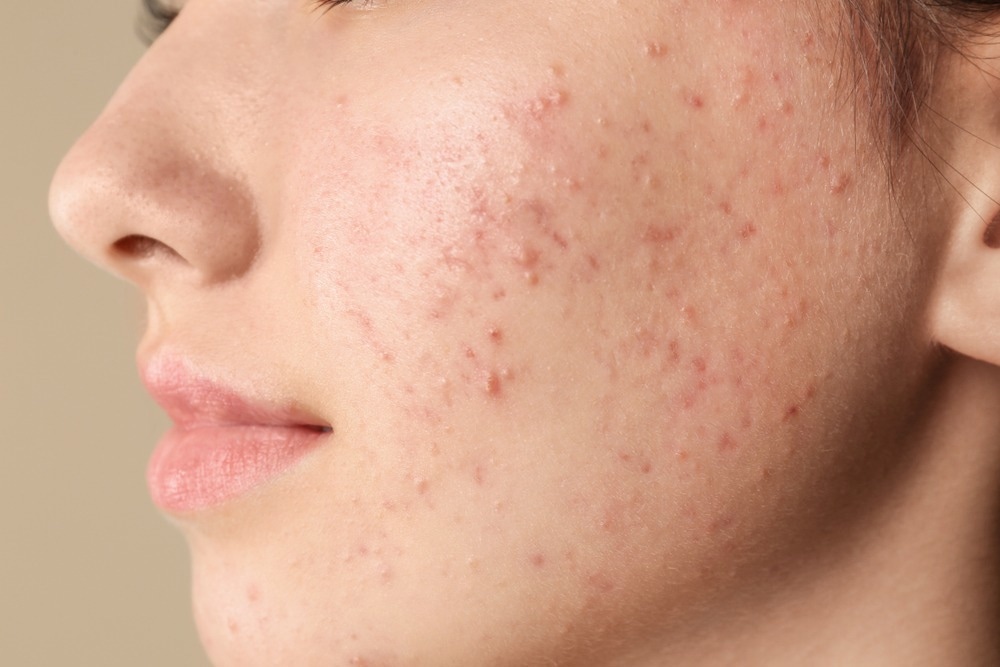Importance of a healthy diet
Effect of diet on skin health
Role of diet in various skin diseases
Skin cancer
Aging skin
Acne
Psoriasis
Recommendations for future research
References
Further reading
Dietary modifications have generally received little attention in dermatological therapy. However, recent studies have discovered a strong link between various dermatological conditions and food.
Nutritional therapy may be recommended for the treatment of acne. Dietary changes may help prevent skin diseases such as skin aging, acne, psoriasis, and skin cancer.

Image Credit: Anastasiia Usenko/Shutterstock.com
Importance of a healthy diet
According to a growing amount of research, dietary modification may function as a component of therapy for various skin diseases. Conditions such as rosacea, acne, psoriasis, aging skin, and atopic dermatitis are all included in this category.
Certain nutrients, foods, or dietary patterns may operate as illness "triggers," while others may prove helpful. In some cases, avoidance or elimination of certain foods may be beneficial, though testing may be advised first.
A dietary pattern that prioritizes the consumption of whole foods over highly processed foods may be able to treat some skin disorders and will undoubtedly be able to prevent the co-morbidities that go along with them.
Effect of diet on skin health
Skin health is intimately related to nutrition, which is necessary for all biological processes affecting the skin, including aging and disease. Consumption patterns and nutritional status both have the power to heal and damage the skin.
In recent years, many people have linked health-nutrition-eating habits to skin health.
Furthermore, clinical research and epidemiology have successfully combined nutrition with tissue and organ health and confirmed that nutritional levels and eating habits impact skin health and aging to some extent.
Role of diet in various skin diseases
The chemical elements included in food are known as nutrients. A meal with sufficient nutrients is essential for building and maintaining body organs, supporting numerous metabolic processes, and generating energy.

Image Credit: Tatjana Baibakova/Shutterstock.com
When proper nutrition is given, the skin's epidermis and dermis function appropriately. The skin's equilibrium can be disturbed by any dietary imbalance, including nutritional deficiency, nutrient insufficiency, excess, and toxic components.
Several deficiencies in vitamins, minerals, and fatty acids produce observable cutaneous symptoms. Skin conditions may result in metabolic disturbances and dietary deficits.
Skin cancer
Nonmelanoma skin cancer (NMSC) is the most prevalent malignancy in the United States, and it will be the initial cancer diagnosis for many individuals. A diet high in fruits and vegetables has been shown in numerous studies to lower the incidence of cancer.
Dietary factors significantly reduce the risk of cancer, especially when it comes to UVR-induced cancer.
However, consuming dietary antioxidants and phytochemicals in the form of whole foods, especially fruits, and vegetables, has shown promise and should be encouraged. The well-documented health benefits of a plant-based diet, such as a lower risk of developing various types of cancer, argue in favor of this strategy.
Aging skin
Changes in the collagen and elastic fibers of the skin, which are themselves affected by food, are associated with sagging skin and loss of elasticity. Specifically, consuming sugar can hasten these indications of aging because it stimulates the cross-linking of collagen fibers.
Glycation is the mechanism responsible for cross-linking. In this process, a covalent link is formed between the amino acids in the dermis's collagen and elastin.
These amino acids are connected by glucose and fructose, which results in the formation of advanced glycation end products (AGEs).
Hyperglycemia accelerates this process. Research reveals that once these cross-links are formed, the body cannot repair them. The accumulation of AGEs can lead to structural changes in the skin, resulting in increased rigidity and decreased suppleness.
Many research studies have also focused on foods that may limit the generation of AGEs. These include herbs and spices like oregano, cinnamon, cloves, ginger, and garlic, as well as chemicals that occur naturally in some fruits and vegetables, such as lipoic acid.
Acne
Despite the limited number of studies studying the relationship between nutrition and acne, there is evidence that diet plays a role in acne and its treatment. Based on a variety of research, there is compelling evidence supporting the involvement of dairy products and high-glycemic-index diets in regulating hormonal and inflammatory variables, which can increase the prevalence and severity of acne.

Image Credit: New Africa/Shutterstock.com
Regular consumption of omega-3 fatty acids and low-GI and low-GL diets is associated with a significant reduction in acne.
Promising results have been found in recent studies on the effects of probiotic supplementation on acne sufferers. However, more research is required to support these preliminary findings.
Psoriasis
Psoriasis is an inflammatory condition that appears to be exacerbated by a diet high in inflammatory foods. A food allergy or a diet with an unbalanced ratio of omega-6 and omega-3 fatty acids might be part of an inflammatory diet.
A gluten-free diet helps many psoriatic patients whose symptoms have become more sensitive to gluten. It is recommended that psoriasis patients follow a low-calorie and low-protein diet.
It is believed that the beneficial effects of a low-calorie, low-energy diet are secondary to changes in polyunsaturated fatty acid metabolism, which alter the eicosanoid profile, including prostaglandins and thromboxanes.
The alleviation of psoriatic symptoms is attributable to a reduction in total protein intake, which inhibits epithelial growth and lowers polyamine levels.
Recommendations for future research
Nutritional deficiency has long been linked to various skin disorders. Recently, the relationship between diet and health has become the topic of many research studies. Nutritional deficits, overconsumption, and metabolic problems can all cause skin diseases associated with diet.
Anecdotal or theoretical evidence suggests that certain diets can help avoid recurrences of numerous skin problems. However, additional research studies are required to understand how nutrient combinations act in the body when taken through the diet and taken as multiple supplements. It is necessary to identify the effective dosage and toxicity of nutritional supplements.
References
- Katta, R. and Desai, S.P., 2014. Diet and dermatology: the role of dietary intervention in skin disease. The Journal of clinical and aesthetic dermatology, 7(7), p.46.
- Cao, C., Xiao, Z., Wu, Y. and Ge, C., 2020. Diet and skin aging—From the perspective of food nutrition. Nutrients, 12(3), p.870. doi: 10.3390/nu12030870
- Basavaraj, K.H., Seemanthini, C. and Rashmi, R., 2010. Diet in dermatology: present perspectives. Indian journal of dermatology, 55(3), p.205. doi: 10.4103/0019-5154.70662
- Baldwin, H. and Tan, J., 2021. Effects of diet on acne and its response to treatment. American journal of clinical dermatology, 22, pp.55-65. Doi: 10.1007/s40257-020-00542-y
Last Updated: Apr 24, 2023